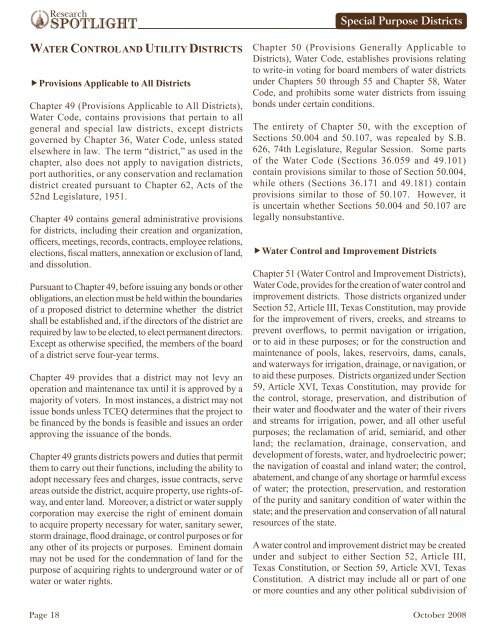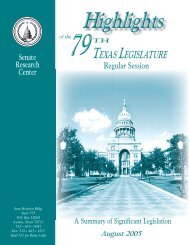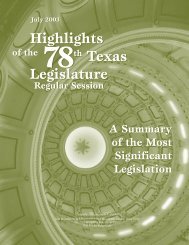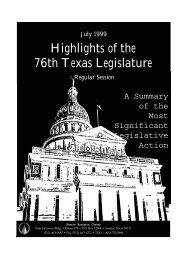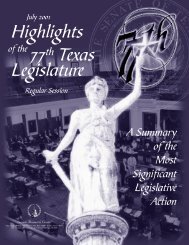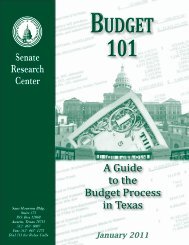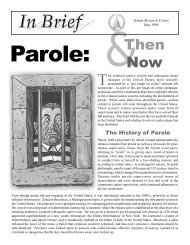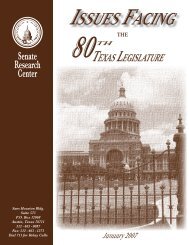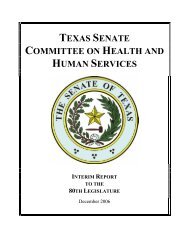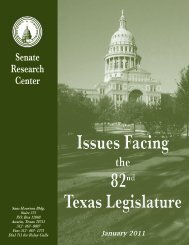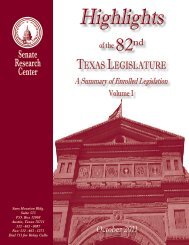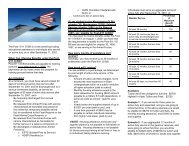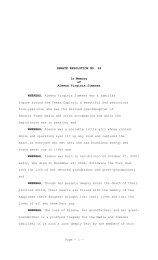Invisible Government: Special Purpose Districts in Texas - Senate
Invisible Government: Special Purpose Districts in Texas - Senate
Invisible Government: Special Purpose Districts in Texas - Senate
You also want an ePaper? Increase the reach of your titles
YUMPU automatically turns print PDFs into web optimized ePapers that Google loves.
Research<br />
SPOTLIGHT<br />
WATER CONTROL AND UTILITY DISTRICTS<br />
ffProvisions Applicable to All <strong>Districts</strong><br />
Chapter 49 (Provisions Applicable to All <strong>Districts</strong>),<br />
Water Code, conta<strong>in</strong>s provisions that perta<strong>in</strong> to all<br />
general and special law districts, except districts<br />
governed by Chapter 36, Water Code, unless stated<br />
elsewhere <strong>in</strong> law. The term “district,” as used <strong>in</strong> the<br />
chapter, also does not apply to navigation districts,<br />
port authorities, or any conservation and reclamation<br />
district created pursuant to Chapter 62, Acts of the<br />
52nd Legislature, 1951.<br />
Chapter 49 conta<strong>in</strong>s general adm<strong>in</strong>istrative provisions<br />
for districts, <strong>in</strong>clud<strong>in</strong>g their creation and organization,<br />
officers, meet<strong>in</strong>gs, records, contracts, employee relations,<br />
elections, fiscal matters, annexation or exclusion of land,<br />
and dissolution.<br />
Pursuant to Chapter 49, before issu<strong>in</strong>g any bonds or other<br />
obligations, an election must be held with<strong>in</strong> the boundaries<br />
of a proposed district to determ<strong>in</strong>e whether the district<br />
shall be established and, if the directors of the district are<br />
required by law to be elected, to elect permanent directors.<br />
Except as otherwise specified, the members of the board<br />
of a district serve four-year terms.<br />
Chapter 49 provides that a district may not levy an<br />
operation and ma<strong>in</strong>tenance tax until it is approved by a<br />
majority of voters. In most <strong>in</strong>stances, a district may not<br />
issue bonds unless TCEQ determ<strong>in</strong>es that the project to<br />
be f<strong>in</strong>anced by the bonds is feasible and issues an order<br />
approv<strong>in</strong>g the issuance of the bonds.<br />
Chapter 49 grants districts powers and duties that permit<br />
them to carry out their functions, <strong>in</strong>clud<strong>in</strong>g the ability to<br />
adopt necessary fees and charges, issue contracts, serve<br />
areas outside the district, acquire property, use rights-ofway,<br />
and enter land. Moreover, a district or water supply<br />
corporation may exercise the right of em<strong>in</strong>ent doma<strong>in</strong><br />
to acquire property necessary for water, sanitary sewer,<br />
storm dra<strong>in</strong>age, flood dra<strong>in</strong>age, or control purposes or for<br />
any other of its projects or purposes. Em<strong>in</strong>ent doma<strong>in</strong><br />
may not be used for the condemnation of land for the<br />
purpose of acquir<strong>in</strong>g rights to underground water or of<br />
water or water rights.<br />
<strong>Special</strong> <strong>Purpose</strong> <strong>Districts</strong><br />
Chapter 50 (Provisions Generally Applicable to<br />
<strong>Districts</strong>), Water Code, establishes provisions relat<strong>in</strong>g<br />
to write-<strong>in</strong> vot<strong>in</strong>g for board members of water districts<br />
under Chapters 50 through 55 and Chapter 58, Water<br />
Code, and prohibits some water districts from issu<strong>in</strong>g<br />
bonds under certa<strong>in</strong> conditions.<br />
The entirety of Chapter 50, with the exception of<br />
Sections 50.004 and 50.107, was repealed by S.B.<br />
626, 74th Legislature, Regular Session. Some parts<br />
of the Water Code (Sections 36.059 and 49.101)<br />
conta<strong>in</strong> provisions similar to those of Section 50.004,<br />
while others (Sections 36.171 and 49.181) conta<strong>in</strong><br />
provisions similar to those of 50.107. However, it<br />
is uncerta<strong>in</strong> whether Sections 50.004 and 50.107 are<br />
legally nonsubstantive.<br />
ffWater Control and Improvement <strong>Districts</strong><br />
Chapter 51 (Water Control and Improvement <strong>Districts</strong>),<br />
Water Code, provides for the creation of water control and<br />
improvement districts. Those districts organized under<br />
Section 52, Article III, <strong>Texas</strong> Constitution, may provide<br />
for the improvement of rivers, creeks, and streams to<br />
prevent overflows, to permit navigation or irrigation,<br />
or to aid <strong>in</strong> these purposes; or for the construction and<br />
ma<strong>in</strong>tenance of pools, lakes, reservoirs, dams, canals,<br />
and waterways for irrigation, dra<strong>in</strong>age, or navigation, or<br />
to aid these purposes. <strong>Districts</strong> organized under Section<br />
59, Article XVI, <strong>Texas</strong> Constitution, may provide for<br />
the control, storage, preservation, and distribution of<br />
their water and floodwater and the water of their rivers<br />
and streams for irrigation, power, and all other useful<br />
purposes; the reclamation of arid, semiarid, and other<br />
land; the reclamation, dra<strong>in</strong>age, conservation, and<br />
development of forests, water, and hydroelectric power;<br />
the navigation of coastal and <strong>in</strong>land water; the control,<br />
abatement, and change of any shortage or harmful excess<br />
of water; the protection, preservation, and restoration<br />
of the purity and sanitary condition of water with<strong>in</strong> the<br />
state; and the preservation and conservation of all natural<br />
resources of the state.<br />
A water control and improvement district may be created<br />
under and subject to either Section 52, Article III,<br />
<strong>Texas</strong> Constitution, or Section 59, Article XVI, <strong>Texas</strong><br />
Constitution. A district may <strong>in</strong>clude all or part of one<br />
or more counties and any other political subdivision of<br />
Page 18 October 2008


